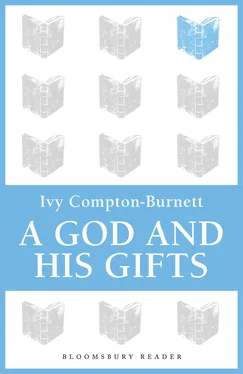“I don’t think it matters about a father. Anyhow there is no rule. Perhaps we only have rules that can be kept.”
Henry ran into the room and paused with his eyes on Trissie’s face.
“Poor sister—!” he said, at a loss for the name. “Come to stay with us and then cry.”
“I can’t help it,” she said, speaking to anyone who heard her. “It is all through me. You were happy, and you will never be again. And I have not done anything. I never have. I am not a person who could. When people are kind to me, it is because I am less than they are. I did not want to be. I wish I was not. How could I think it was anything more, when it has never been?”
Henry waited for her to pause, placed a doll on her lap, and went on to Hereward. He was not taken up as he expected, as his father was conscious about showing his feeling for him.
“Dear, dear doggie!” he said, looking round. “Not run after Henry any more.”
“So you met the dog again?” said Ada.
“Oh, yes, met him.”
“No, you know we did not,” said Nurse. “You must say what is true.”
“Oh, yes, always say it.”
“You only thought about the dog?” said Hereward.
“Yes, think about him. And he think about Henry.”
“What a nice doll it is!” said Trissie.
“It is mine, you know,” said Henry, glancing back.
“Will you give it to me for Maud?” said Merton.
“Oh, yes, he will.”
“Are you quite sure you don’t want it?”
“New one,” said Henry.
“Oh, you are a spoilt little boy,” said Nurse.
“Yes, he is. Not Maud; just Henry.”
“Well, you can buy a doll to-morrow,” said Hereward, his voice seeming to assume a return to normal life.
“To-day,” said his son.
“No, the shop is shut,” said Nurse.
“No,” said Henry, whose disregard of truth was equalled by his suspicion of it.
“It will be open in the morning.”
“Very nice shop. Very large. Buy a train.”
“No, no. You are to buy a doll.”
“A kite,” said Henry, with humour in his eyes.
“No, a doll. You must not be greedy.”
“Oh, no. Give one to Maud.”
“Will you give her the new one?” said Merton.
“No, Maud like this one better.”
“Well, let me have it for her.”
“No, one, two. Henry have them.”
“So there is not one for Maud after all?”
“Yes, poor Maud!” said Henry, offering the doll.
“You had better seize the moment,” said Hereward, smiling at Merton, and going to the door.
“Well, what a scene!” said Salomon to Reuben. “What power we had, that we thought we should not use! I suppose people always use it. The sense of having it leads to one end.”
“I was driven to it. And no wrong is done. We were living over a morass. The surface was already broken. Uncle Alfred and Grandma knew.”
“I can say nothing,” said Merton. “There is nothing that can be said. What is unspeakable must be unspoken. It will be in the end. It is not that it throws Father off the heights. He was never on them to me. It has done something that will never be undone.”
“But he is to return to the heights,” said Reuben. “You are to find you have never liked him so well. You gave your own hint of it.”
“And it is what happens when wrong-doers are exposed,” said Salomon. “I always feel I should like them less. But it seems to be unusual.”
“You must go, Aunt Penelope?” said Ada. “It has been a strange day for you. You will come in future with a new knowledge. You will know what lies under the surface of our life. Well, we shall talk with a full understanding. And Father will not carry hidden thoughts.”
“It seems that a good deal of good has been done,” said Joanna. “Of course we know that truth is best. But sometimes it hardly seems it would be. I am rather surprised that it is.”
“You feel the moment is a light one, Grandma?” said Merton.
“What a word for a writer, Merton! Surely you know about the melancholy that underlies all humour.”
“It now underlies everything for me. Nothing can be set apart.”
“There may be little outward change,” said Zillah. “We shall know what we do, and never mention it. The subject will protect itself.”
“Then it is not like other subjects,” said Joanna. “But then I suppose it is not. There would not be any subjects, if we had not developed the power of speech. They are not really natural!”
“It does not seem the word for this one,” said Salomon. “And the guests will be gone and leave us with it. How will Father meet the occasion? He may be equal to it. He must have carried off a good many.”
Hereward carried off this occasion by at once ignoring and accepting it. He joined in the talk as it arose, neither alluding to the disclosure nor avoiding what it involved, and as soon as it was natural, spoke of his work and left them.
Sir Michael had sat by himself, hardly glancing at his son, and speaking barely enough to avoid the effect of silence. He leaned back with an open sigh.
“Well, this is a relief. It is a chance to sort our thoughts. We have to get used to the truth. I admit I find it much. I feel I shall never see Hereward without remembering it. And perhaps we ought not to forget. It is sad knowledge for his sons. And my Zillah has had to carry it alone. She could not turn to her father.”
“Hereward and I shared it, Father, as we have shared everything.”
“You were nearer to him than his wife,” said Ada. “It was as it had to be. I suppose it is how it has always been.”
“His wife was hardly the person to share this secret,” said Salomon. “It was largely because of her, that it had to be one.”
“I am a wronged wife,” said Ada, almost musingly. “It is a strange thought. And that I accept it is stranger. I wonder how I shall feel to Hereward, how I shall manage our life together. It will be a test.”
“Ah, you will be equal to it,” said Sir Michael. “I have no doubt of you, my dear. I am as proud of my son’s wife as I am of my son. She is as much above him in one way, as he may be above her in another. And her way may be the better. To me I admit it is. This is a grief to me. I can’t deny it.”
“Grandpa feels it more than anyone,” said Reuben, resuming his usual tone. “He must be a very good man.”
“Grandma has always known,” said Salomon. “And she has not felt it at all. What a good thing she is not a very good woman!”
“I admire goodness,” said Sir Michael. “I can’t say I do not. I don’t mean I am good myself. I admire it wherever I meet it. Hereward has been a good son to me. He has not failed his father. It is not for me to judge.”
“It is for us all to judge this,” said Reuben. “There must be some moral standard in human life.”
“Standards seem to be based on the likelihood of their being violated,” said Joanna. “I suppose my son is a man like other men. Though I am not sure that so many men are. You see your grandfather is not. I don’t think there is such a thing as a woman like other women. Perhaps there are no other women. Or not enough of them to count.”
“There is a child who may be like other children,” said Merton. “But in this house it would not be believed.”
“Let us go and look at him,” said Trissie. “Children are so pretty when they are asleep. And he will grow into a boy and be different.”
“And boys are so often awake,” said Reuben. “And we have noticed the difference.”
“I will go home,” said Hetty. “Merton can follow me later.”
“As you will,” said her husband. “I shall not be very long.”
Читать дальше












